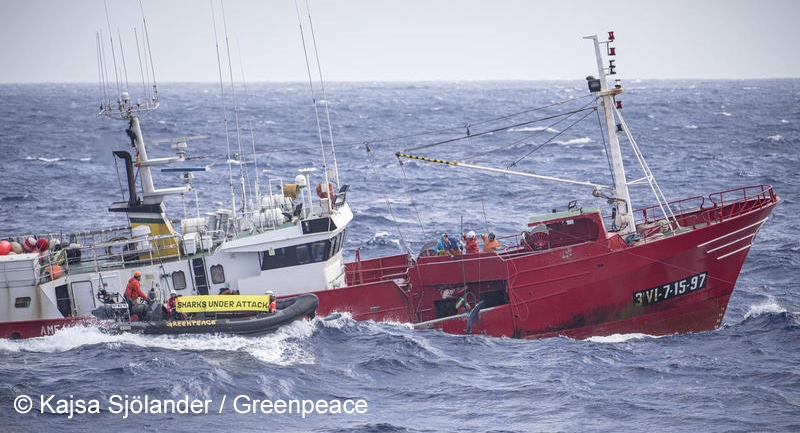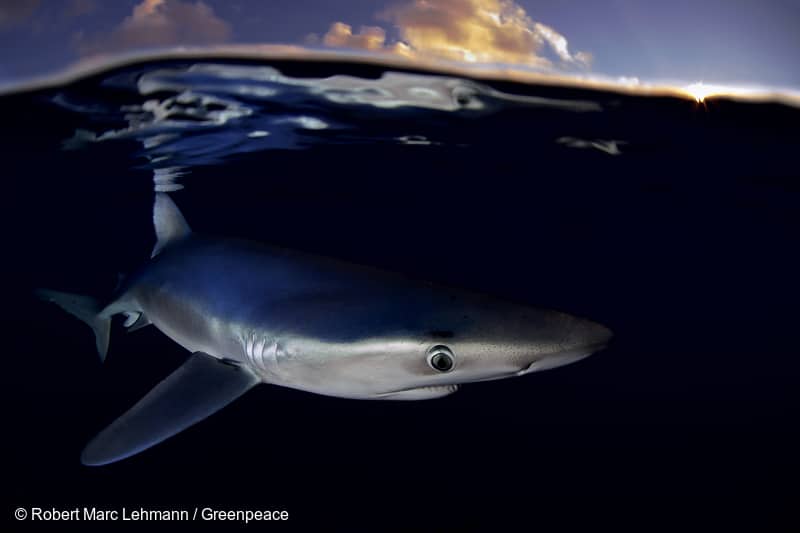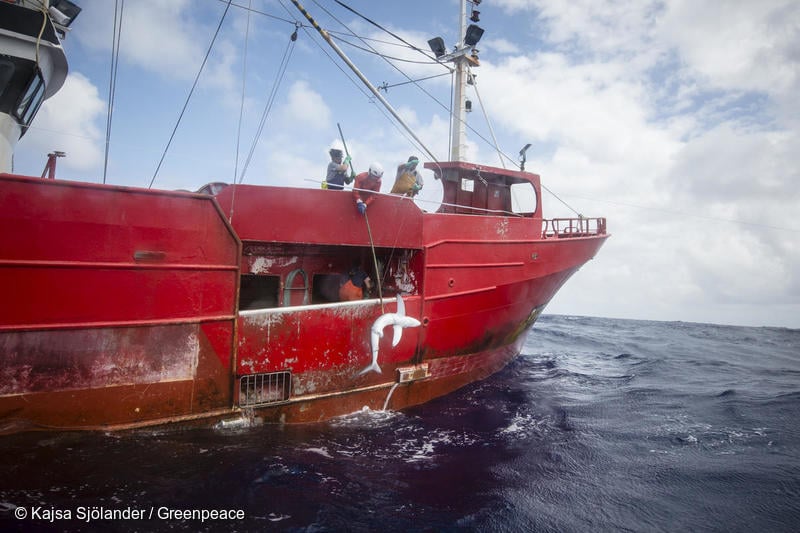News
Thousands of endangered sharks slaughtered by overfishing

![]() Activists from Greenpeace International confronted a fishing vessel yesterday approximately 200 miles away from The Azores as it was hauling in sharks on a longline, capturing shocking footage of the vessel’s practices. The peaceful protest saw activists unfurl a banner with the message “Sharks Under Attack” and came as Greenpeace International releases a new report that reveals lack of protection in international waters is resulting in the deaths of tens of thousands of endangered sharks each year.
Activists from Greenpeace International confronted a fishing vessel yesterday approximately 200 miles away from The Azores as it was hauling in sharks on a longline, capturing shocking footage of the vessel’s practices. The peaceful protest saw activists unfurl a banner with the message “Sharks Under Attack” and came as Greenpeace International releases a new report that reveals lack of protection in international waters is resulting in the deaths of tens of thousands of endangered sharks each year.
In the North Atlantic, the Greenpeace ship Esperanza documented fishing vessels which, while known to be primarily catching swordfish, in fact collectively catch four times more sharks than swordfish (by weight). During the protest, the crew saw only one swordfish caught by the Spanish vessel Ameal and at least 8 sharks pulled from a line nearly 40 miles long. The shark species are currently being identified.

A Blue Shark (Prionace glauca) near the Azores.
“It is absolutely immoral to kill sharks and other wildlife with these terrible fishing practices. We are exposing the culprits at sea now, but we urgently need a strong treaty and tighter fishing limits to protect our global oceans,” said Will McCallum of Greenpeace’s Protect the Oceans campaign, on board the Esperanza.
The report also highlights the devastating impact that overfishing is having on shortfin mako shark populations, the world’s fastest shark, which is closely related to the great white. Greenpeace’s analysis shows that Spanish and Portuguese ships in the area are catching as many as 25,000 mako sharks annually.

Greenpeace ship Esperanza is investigating the overfishing of sharks in the North Atlantic ocean on transit to the Azores, Pole to Pole Tour 2019
The fishing vessels follow migratory routes of swordfish, using destructive methods like long lines with thousands of hooks, which also kill sharks and other animals. Sharks are mainly targeted for their fins, which some cultures prize as a delicacy.
An estimated 100 million sharks are killed every year. Greenpeace analysis shows that, despite official estimates that immediately stopping all catch of shortfin mako would result in only a 50 percent chance of their population recovering by 2040, the most recent catch data was 3,112 metric tons in 2017, equating to as many as 25,000 endangered sharks.
The report is launched as the Esperanza sails from the Arctic to the Antarctic undertaking ground-breaking research and investigations to campaign for a strong Global Ocean Treaty at the United Nations. A strong treaty could pave the way for the creation of ocean sanctuaries in 30 percent of the high seas by 2030, placing vast areas of the sea off-limits to harmful human activities and allowing marine life to recover.
Today there is no legal mechanism to create ocean sanctuaries in international waters and only around 1 percent of the oceans are fully protected. Alongside the widespread failure of industry and regional bodies to adhere to scientific advice, this enables the fishing industry to devastate marine ecosystems by using harmful practices to overfish, often in sensitive areas, and decimate shark populations worldwide. Many species of sharks are in danger of extinction and some populations have decreased by as much as 99 percent due to human activity.
Lifelong UK fisherman Jerry Percy, who has represented small–scale, sustainable fishermen across Europe, was on board the Esperanza and said:
“Smaller scale fishermen rely on healthy populations of sharks and other fish species at the top of the food chain to maintain the balance of marine life in the oceans. This allows us to make a sustainable living and at the same time support vulnerable coastal communities. But unregulated and lawless fishing is putting all this at risk, for short term profit for the few but long term losses for the many.”
Greenpeace USA Oceans Campaigner Arlo Hemphill added:
“Unfortunately, when it comes to the 64 percent of the ocean that lies in international waters, there is no organization or nation authorized with protecting its wildlife. There are bodies designed to protect fisheries, shipping, undersea cables, and even deep sea mining, but the species at risk and the broader ecosystem are largely on their own. This is why governments are negotiating a new ocean treaty, and why Greenpeace is calling for that treaty to be strong and endowed with the decision-making authority to set up ocean sanctuaries in places important to animals like these sharks.”
For more information about the work of Greenpeace visit their website by clicking here.
Gear News
Introducing the TR-80, IR-50 and CS-30 Regulators from DYNAMICNORD

Whether you are a beginner or a professional diver – with the three new main regulators from DYNAMICNORD, everyone will find their favourite regulator. They all look super stylish.
Excellent performance with the TR-80
Quality and performance are the be-all and end-all for regulators. It is not for nothing that the TR stands for Tec Reg. The innovative design of the TR-80 guarantees absolute reliability – even in ice-cold waters.

Perfect breathing effort at 0.8 J/l / certified for diving in waters below 10 degrees / structural design made of solid brass for best cold protection / membrane-compensated design with dry seal of the first stage / reduced exhalation effort thanks to optimized exhalation membrane and bubble deflector / adjustable Venturi (dive/predive) and adjustment knob for individual inhalation comfort / innovative design of the front cover prevents free-flow in strong currents or when diving with scooters / design made of sandblasted brass, matt chrome finish / 2 HP and 4 LP outlets / mouthpiece made of high-quality, anti-allergic silicone for maximum comfort.


Amazing underwater adventures with the IR-50
The IR-50 is the top regulator for advanced and experienced divers. Natural breathing is the essence of this regulator.

Ideal breathing effort at 0.8 J/l /certified for diving in waters below 10 degrees / compensated membrane / adjustable venturi (dive/predive) and adjustment knob for individual inhalation comfort/ outlet valve and deflector for minimum exhalation effort and reduction of bubbles on the face / design made of sandblasted brass, matt chrome finish / 2 HP and 4 NP outlets / mouthpiece made of high-quality, anti-allergic silicone for maximum comfort.


The Workhorse – our CS-30
For diving centres and diving beginners – the workhorse stands for strong construction, reliability and robustness. Perfect for your training.

Optimal breathing effort at 0.8 J/l /recommended for diving in waters above 10 degrees / non-compensated piston / adjustable venturi (dive/predive) / outlet valve and deflector for minimum exhalation effort and reduction of bubbles on the face / design made of sandblasted brass, matt chrome finish / 1 HP and 3 NP outlets / mouthpiece made of high-quality, anti-allergic silicone for maximum comfort.


Octopus OP-30
The OP-30 is the ideal addition to all DYNAMICNORD regulators. It is identical in construction to the CS-30.

The TR-80, IR-50, CS-30 (DIN & INT) regulators and the Octopus OP-30 are available from DYNAMICNORD dealers and in the online store.
DYNAMICNORD – Your Outdoor Companion.
Marine Life & Conservation
Paul Watson Released as Denmark Blocks Japan’s Extradition Bid

Renowned anti-whaling activist Paul Watson has been released from custody in Greenland after spending five months in detention. Denmark’s Justice Ministry rejected Japan’s request for his extradition, citing insufficient guarantees that his time already served in custody would be credited against any potential sentence.
The 74-year-old Canadian-American was arrested on July 21 in Nuuk, Greenland’s capital, when his ship docked to refuel. His arrest was based on a 2012 Japanese warrant related to a 2010 encounter in Antarctic waters. Japan alleged Watson obstructed operations and caused damage to a whaling research ship during efforts to disrupt illegal whaling. Watson has consistently denied these claims, maintaining his commitment to marine conservation.
Denmark, which oversees extradition matters for Greenland, concluded that while the legal conditions for extradition were met, the lack of assurances from Japan regarding time-served credit made extradition untenable.
In a video shared by his foundation, Watson expressed gratitude and relief, saying, “After five months, it’s good to be out… and good to know they’re not sending me to Japan.” He added that the most difficult part of his time in custody was being separated from his two young sons.
Watson is a pioneering figure in marine conservation, known for founding the Captain Paul Watson Foundation in 2022 after decades of activism with the Sea Shepherd Conservation Society. His bold efforts to defend marine life have earned him widespread support, including from celebrities and conservationists. His work has also been featured in the acclaimed reality TV series Whale Wars.
Watson’s lawyer, Jonas Christoffersen, praised the decision, stating, “We are happy and relieved that Paul Watson is now free.” He added that Watson is eager to reunite with his family and continue his vital work.
The arrest occurred while Watson’s vessel, the M/Y John Paul DeJoria, was en route to the North Pacific with a team of 26 volunteers to intercept a Japanese whaling ship. His foundation described the arrest as politically motivated and emphasized that Watson’s actions were focused on ending illegal whaling practices.
Japan resumed commercial whaling in 2019 after leaving the International Whaling Commission, asserting that whale meat is a cultural tradition. Conservationists, however, continue to challenge these practices, highlighting their impact on marine ecosystems.
Despite the challenges, Watson remains steadfast in his mission to protect marine life and bring attention to whaling practices. His dedication to ocean conservation has made him a globally respected advocate for the environment.
-

 News2 months ago
News2 months agoIconic SS United States to become the World’s Largest Artificial Reef
-

 News3 months ago
News3 months agoBook Review – 52 Assignments: Underwater Photography
-

 Gear News3 months ago
Gear News3 months agoDYNAMICNORD – New German diving brand enters the British market
-

 News3 months ago
News3 months agoExploring Cenote El Pit: A Diver’s Dream
-

 Gear News3 months ago
Gear News3 months agoTry BARE drysuits (and maybe even win one!) this Friday with Sea & Sea at North West Dive Fest
-

 Marine Life & Conservation3 months ago
Marine Life & Conservation3 months agoBook Review: Coral Triangle Cameos
-

 Blogs2 months ago
Blogs2 months agoDive the Egyptian Red Sea this Autumn with Regaldive
-

 News3 months ago
News3 months ago2024 Ocean Art Underwater Photo Competition Announced















